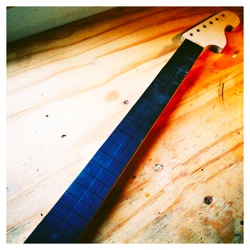The Future of Ebony: None More Black
Ebony conservation
The times, they are a changing folks.
I recently watched a short talk by Bob Taylor (of Taylor Guitars fame) about the sustainability of ebony harvesting and what it means for guitar makers. It's pretty interesting and it's embedded below. You should really take a look as it's important on a number of levels—not least for the impact this will have on future guitars.
The upshot of things is this:
To get you and me that, perfectly black, ebony fingerboard the guys cutting the trees have to cut down nine unsuitable trees for every one that's the right colour. These nine trees don't have enough return to make it profitable to haul them out of the forest so they're just left there to rot.
Bob Taylor's made the (right) decision that this is idiotic. From now on, the ebony that would have been scrapped, purely because it's not uniformly black, will be harvested, distributed and used in instrument manufacture. And not just with Taylor Guitars. This will become industry-wide.
What it means for you, the guitar-buying geek on the street, is that, in the future, any ebony parts (mainly fingerboards for the most part) may not be completely black but may contain streaks of lighter browns and even cream. Now, I've worked with 'B-grade' ebony before. Personally, I quite like a little colour and pattern in the wood. It doesn't bother me in the least and it has no discernible impact on the tone. If it bothers you, I think you'll have to work on getting over it.
Guitarists are, at heart, a conservative bunch. We don't like change. That may make the future tough for some of us as things are changing. This issue isn't new. Guitar-making contains more than a few species of wood that have been, all but, harvested to extinction. As well as ebony, we've chased rosewood and mahogany around the globe as it became too rare/expensive/restricted in different countries. Koa is getting harder and harder to source, as is adirondack spruce. Even sitka has a question mark attached. That's just off the top of my head. More and more species of tonewood are becoming hard or impossible to get.
Obviously, this isn't just down to guitar manufacture but we've certainly played an increasing role in these problems as demand for instruments has grown and grown. The truth is, though, it doesn't matter whose fault this is. The situation is what it is.
Things are changing. Different woods and even other materials will have to be used in guitar manufacture. There's no choice in this.
So, to the conservatives (which sometimes includes myself), I would say this: Keep an open mind. Actually listen to the sound of new woods, materials and build-methods before heading off to the nearest forum to decry them. And I mean properly listen—organise a blind test if you have to because our brains aren't good at overcoming ideas that have already wormed their way into our heads.
Bob Taylor's right: We can't fight this. And it's not just ebony so we've got to roll with the punches.

